 In the wake of US newspaper USA Today recently unveiling a new version of their site with more cutting edge ‘new media’ features than any other, I thought it might be a good time to have a look at the challenges posed to newspapers by the onslaught of new media, what they are be doing about it and what they should be doing about it.
In the wake of US newspaper USA Today recently unveiling a new version of their site with more cutting edge ‘new media’ features than any other, I thought it might be a good time to have a look at the challenges posed to newspapers by the onslaught of new media, what they are be doing about it and what they should be doing about it.
The Challenge
Undeniably new media (that is, the general availability of the Internet and the new types of publishing it enables, such as blogs and podcasting) has had a significant negative impact on circulation of newspapers. There are roughly two schools of thought over why this has occurred. The cynics would argue that it is because the ‘old media’ no longer has the trust of the public, and instead people turn to indie publishers, such as bloggers and podcasters, to provide information on what is happening in the world around them. A more moderate viewpoint would be that the Internet has lowered the barrier to entry into the publishing industry to such an extent that anyone and everyone can publish content (the long tail effect), thus inevitably reducing market share of the big players. It would seem that this view is the more sensible.
If newspapers wish to stay relevant therefore, they are forced to innovate in the realm of new media. Their future circulation is at stake, and if they fail to successfully capture market on the web they miss out on potentially millions of pounds worth of advertising a year. Hence the effort the newspapers are putting into finding a way forward.
What are they doing about it?
The biggest, and perhaps most notable addition to the newspaper’s content production is audio visual content (AVC). AVC refers to anything from podcasts to video blogs to video news reports. These are of crucial importance because of the value they provide to the consumer’s experience above and beyond that found in the newspaper.
 The recently relaunched Times Online seems to be taking this the most seriously with the launch of an entire AVC section. They are currently providing over 10 different podcast series, and video content from their Iraqi correspondent and a car review show. Whilst the Times Online is making an admirable effort, my personal favourite newspaper podcasting effort is that of the Comment is Free section of the Guardian Unlimited website. I particularly enjoy their Media Talk podcast, to which I devotedly listen every week.
The recently relaunched Times Online seems to be taking this the most seriously with the launch of an entire AVC section. They are currently providing over 10 different podcast series, and video content from their Iraqi correspondent and a car review show. Whilst the Times Online is making an admirable effort, my personal favourite newspaper podcasting effort is that of the Comment is Free section of the Guardian Unlimited website. I particularly enjoy their Media Talk podcast, to which I devotedly listen every week.
Another noticeable theme is the rise of user generated content (UGC). This is when users add any of their own content to a site, whether by means of a blog comment, uploaded video or anything else. This is an important trend for newspapers to be adopting for two reasons. The first is that users have come to expect the ability to add their thoughts to a story; provision of comments enhances conversation, and thus interest in the story and ‘stickiness’ of the site as users return to read comments in response to their own. The second reason is that UGC is ideal for any business looking to monetise content through advertising because it provides virtually free content, next to which can be placed fee-paying ads.
Almost all the recent newspaper Website relaunches (such as that of the Times and the Telegraph) have the ability to add comments, as well as more the forward-looking Guardian Unlimited, which has had the feature for some time. However, by far the most adventurous in UGC is the recent relaunch of the USA Today site. USA Today is building a fairly robust social network around their content, which allows users to comment, have their own avatar, ‘recommend’ (effectively digg) stories as well as a profile page.
Taking it further
Over time it is clear that the journalist will have to become an expert in all types of media. They will have to be able to easily transition from writing a story for a newspaper to producing a podcast interview to setting up and tweaking an installation of WordPress. Whilst many journalists will be struggling to be as technically proficient as this requires, I believe the necessary skills will develop over time.
The temptation will be for newspapers’ websites to become more and more like a combination between Weblogs, Inc and Digg, with loose editorial control and use of wisdom of the crowds to determine top stories. It is crucial that this is resisted, because to move in this direction would mean that newspapers would lose their unique selling point of quality, carefully edited content.
The challenge, therefore, is for newspapers to continue to innovate without losing sight of why they are important sources of news. If they succeed, they will continue to flourish, otherwise perish.
 The full day event, running at the Frontline Club, is billed as “The Strategy, Technology and Business Case for Content Description, Visibility, Search and Discovery.”
The full day event, running at the Frontline Club, is billed as “The Strategy, Technology and Business Case for Content Description, Visibility, Search and Discovery.”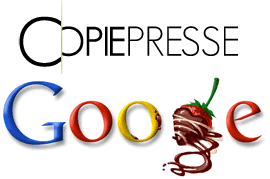 The case was brought by Copiepresse, a copyright protection organisation that was representing 17 [UPDATE (thanks Michel) French-speaking] Belgian newspapers, complaining that both Google’s search and News service were in breach.
The case was brought by Copiepresse, a copyright protection organisation that was representing 17 [UPDATE (thanks Michel) French-speaking] Belgian newspapers, complaining that both Google’s search and News service were in breach.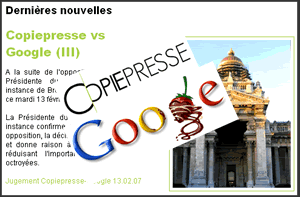
 Microsoft is officially launching its updated next-gen, ‘Live Search’, search engine today as the company tries hard to catch up with market leaders Google and Yahoo.
Microsoft is officially launching its updated next-gen, ‘Live Search’, search engine today as the company tries hard to catch up with market leaders Google and Yahoo. In line with its rivals, Live Search will also feature a new social search service called QnA, where surfers can pose questions and get answers from other users.
In line with its rivals, Live Search will also feature a new social search service called QnA, where surfers can pose questions and get answers from other users.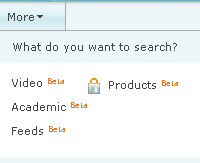 Microsoft’s new search engine – with its Google-a-like super-simple homepage – has been in public beta testing since March at Live.com, which is also shaking off its beta status this week.
Microsoft’s new search engine – with its Google-a-like super-simple homepage – has been in public beta testing since March at Live.com, which is also shaking off its beta status this week.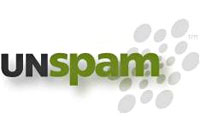 Unspam Technologies has announced the launch of a new website – lostinthecrowd.org – that sneakily helps keep Web searches private.
Unspam Technologies has announced the launch of a new website – lostinthecrowd.org – that sneakily helps keep Web searches private. Of course, routinely clearing the cookies from your browser is the safest option, but Lost in the Crowd takes a different approach by automatically placing random queries through the search engines you use from your tracking cookie.
Of course, routinely clearing the cookies from your browser is the safest option, but Lost in the Crowd takes a different approach by automatically placing random queries through the search engines you use from your tracking cookie.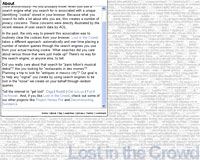 Langheinrich said that Unspam has no intention of making any money out of the service, citing that the site’s sole purpose was to focus people to the issue of online privacy.
Langheinrich said that Unspam has no intention of making any money out of the service, citing that the site’s sole purpose was to focus people to the issue of online privacy. Google took the opportunity of their annual press briefing at the Googleplex to inform the assembled hacks of four new applications. The theme they were trying to push was ‘honest we _are_ a search company.”
Google took the opportunity of their annual press briefing at the Googleplex to inform the assembled hacks of four new applications. The theme they were trying to push was ‘honest we _are_ a search company.” There’s also a feature to compare two search terms, our favourite so far being
There’s also a feature to compare two search terms, our favourite so far being  Google Desktop 4 & Google Gadgets
Google Desktop 4 & Google Gadgets Search engine big-boys Yahoo have unveiled a shopping site for consumer electronics backed up by expert advice and user-contributed reviews.
Search engine big-boys Yahoo have unveiled a shopping site for consumer electronics backed up by expert advice and user-contributed reviews. The magazine-style site will use Yahoo’s tried and trusted community tools to help users find information about products and prices and share their opinions with friends, family and other consumers.
The magazine-style site will use Yahoo’s tried and trusted community tools to help users find information about products and prices and share their opinions with friends, family and other consumers.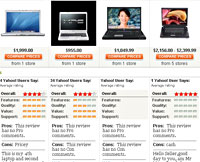 Content
Content The new Yahoo! Tech is currently focussed on the U.S. market, with Houston saying that there are no imminent plans to expand into other countries.
The new Yahoo! Tech is currently focussed on the U.S. market, with Houston saying that there are no imminent plans to expand into other countries. The US mobile companies are finally, really getting hold of delivering content of all sorts to mobile phones.
The US mobile companies are finally, really getting hold of delivering content of all sorts to mobile phones. As with all things to mobile phones, we’d love to see the figures as to who actually pays for access to this. A barrier which has yet to be consistently cracked.
As with all things to mobile phones, we’d love to see the figures as to who actually pays for access to this. A barrier which has yet to be consistently cracked. The English version of Wikipedia has now notched up more than one million articles, according to the Wikimedia Foundation, the fellas who run the free online encyclopedia.
The English version of Wikipedia has now notched up more than one million articles, according to the Wikimedia Foundation, the fellas who run the free online encyclopedia. Wikipedia’s reach is truly global, with versions of the encyclopaedia currently available in 125 languages, containing a total of 3.3 million articles.
Wikipedia’s reach is truly global, with versions of the encyclopaedia currently available in 125 languages, containing a total of 3.3 million articles. With the million-article mark passed and the Wikimedia Foundation estimating that new articles are coming in at a rate of 1,700 new articles every day, our back-of-a-beer-mat calculation reckons they’ll be hitting 2 million sometime 2009.
With the million-article mark passed and the Wikimedia Foundation estimating that new articles are coming in at a rate of 1,700 new articles every day, our back-of-a-beer-mat calculation reckons they’ll be hitting 2 million sometime 2009. Yahoo is launching a new service aimed at making it easier for users to connect to Yahoo Internet-based services through multiple Web-connected devices, including mobiles and TVs.
Yahoo is launching a new service aimed at making it easier for users to connect to Yahoo Internet-based services through multiple Web-connected devices, including mobiles and TVs.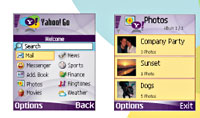 So long as the device is connected to the Internet, users will be able to access their personal Yahoo content such as photos, email and address books.
So long as the device is connected to the Internet, users will be able to access their personal Yahoo content such as photos, email and address books. Yahoo! will be rolling out their Go TV service in the next few months, with the service enabling users to access various other Web based services for TVs, including local movie listing search and personalised MyYahoo! functions.
Yahoo! will be rolling out their Go TV service in the next few months, with the service enabling users to access various other Web based services for TVs, including local movie listing search and personalised MyYahoo! functions.